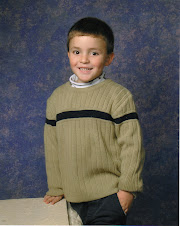Excellent resources for parents, teachers, siblings and friends.
Do you have a loved one with Asperger's Syndrome
What is Asperger's syndrome?
What is Asperger's Syndrome?
If you have met one child with Asperger's, you have met one child with Asperger's. That's how difficult it is to describe this condition. But I will try.
Asperger Syndrome is a neurobiological disorder. AS has been recognized as a distinct medical condition in Europe for almost 60 years, but has only been included in the U.S. medical diagnostic manual since 1994.Individuals with AS exhibit serious deficiencies in social and communication skills. Their IQ's are typically in the normal to very superior range. They are usually educated in the mainstrream, but most require special education services. Because of their naivete, those with AS are often viewed as "odd" by their peers and are frequently a target for bullying and teasing.They want to fit in socially and have friends, but have a great deal of difficulty making effective social connections. Many of them are at risk for developing mood disorders, such as anxiety or depression, especially in adolescence.
Characteristics of Asperger Syndrome
Each person is different. An individual might have all or only some of the described behaviors to have a diagnosis of AS.
-Marked impairment in the use of multiple nonverbal behaviors such as: eye gaze, facial expression, body posture, and gestures to regulate social interaction.
-Extreme difficulty in developing age-appropriate peer relationships.
-Inflexible adherence to routines and perseveration.
-Fascination with maps, globes, and routes.-Superior rote memory.
-Preoccupation with a particular subject to the exclusion of all others.
-Difficulty judging personal space, motor clumsiness
-Sensitivity to the environment, loud noises, clothing and food textures, and odors.
-Speech and language skills impaired in the areas of semantics, pragmatics, and prosody (volume, intonation, inflection, and rhythm).
-Difficulty understanding others' feelings.
-Formal style of speaking; often called the "Little Professor" Syndrome.
-Extreme difficulty reading and /or interpreting social cues.
-Socially and emotionally inappropriate responses.
-Literal interpretation of language, difficulty comprehending implied meanings.
-Extensive vocabulary. Reading begins at an early age (hyperlexia).
-Stereotyped or repetitive mannerisms.
-Difficulty with "give and take" of conversation.
If you have met one child with Asperger's, you have met one child with Asperger's. That's how difficult it is to describe this condition. But I will try.
Asperger Syndrome is a neurobiological disorder. AS has been recognized as a distinct medical condition in Europe for almost 60 years, but has only been included in the U.S. medical diagnostic manual since 1994.Individuals with AS exhibit serious deficiencies in social and communication skills. Their IQ's are typically in the normal to very superior range. They are usually educated in the mainstrream, but most require special education services. Because of their naivete, those with AS are often viewed as "odd" by their peers and are frequently a target for bullying and teasing.They want to fit in socially and have friends, but have a great deal of difficulty making effective social connections. Many of them are at risk for developing mood disorders, such as anxiety or depression, especially in adolescence.
Characteristics of Asperger Syndrome
Each person is different. An individual might have all or only some of the described behaviors to have a diagnosis of AS.
-Marked impairment in the use of multiple nonverbal behaviors such as: eye gaze, facial expression, body posture, and gestures to regulate social interaction.
-Extreme difficulty in developing age-appropriate peer relationships.
-Inflexible adherence to routines and perseveration.
-Fascination with maps, globes, and routes.-Superior rote memory.
-Preoccupation with a particular subject to the exclusion of all others.
-Difficulty judging personal space, motor clumsiness
-Sensitivity to the environment, loud noises, clothing and food textures, and odors.
-Speech and language skills impaired in the areas of semantics, pragmatics, and prosody (volume, intonation, inflection, and rhythm).
-Difficulty understanding others' feelings.
-Formal style of speaking; often called the "Little Professor" Syndrome.
-Extreme difficulty reading and /or interpreting social cues.
-Socially and emotionally inappropriate responses.
-Literal interpretation of language, difficulty comprehending implied meanings.
-Extensive vocabulary. Reading begins at an early age (hyperlexia).
-Stereotyped or repetitive mannerisms.
-Difficulty with "give and take" of conversation.
Subscribe to:
Post Comments (Atom)


2 comments:
Colleen,
Thanks for stopping by my blog. It's wonderful to see an aunt taking such an interest in her nephew's challenge. Your site is wonderful, and I hope to be one of your regular readers.
Best of luck to you and your family,
Carla Graham
Thanks so much!! I just posted a picture of my adorable nephew. Check it out! Together, we can help each other!! Colleen
Post a Comment